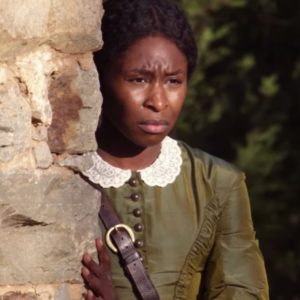HARRIET achieves the proper, and richly deserved, tone of reverence for its subject, Harriet Tubman. That is, alas, its greatest failing. The astonishing life of one of the most courageous Americans who has ever lived is told in a series of set pieces, vignettes with all drama sapped from them as they take on the air of a secular Stations of the Cross. The brutality is ritualized, the ending no surprise, with only an inspired and counterintuitively quiet performance by Cynthia Erivo in the title role to elevate the proceedings.
Tubman, an illiterate Maryland woman born into slavery but married to a free man (Zackary Momoh), has an epiphany at the start of the film. Her attempt to legally prove her status as a free woman is brushed aside by her master (Mike Marunde) with the casual assaults, verbal and physical, that defined her slave status. Broken-hearted, she turns to prayer, asking God to strike down her wicked master. When he subsequently dies, and Tubman realizes that she is about to be sold away from her family for having dared to question her bondage, she runs. Alone and with only the sketchiest of instructions, courtesy of contacts along the Underground Railroad, and subject to spells in which she has visions of the future, she makes it 100 miles to freedom in Philadelphia. A year later, pining for her husband and family, she returns to Maryland to lead them to freedom, starting a mission that will continue until the Civil War.

Cynthia Erivo
On the plus side, the emphasis here is on Harriet herself, the men in her story take on a strictly ancillary role. From the nameless man who doesn’t let on that he knows Harriet is hiding in his hay wagon, to William Still (Leslie Odom, Jr), who runs the anti-slavery group in Philadelphia that gets Tubman settled in her new life, there’s never a doubt that she is the driving force, and that if it hadn’t been them, she would have succeeded with others to help. And when Still tells her that she can’t go back to the south to rescue her family, the subsequent dialogue with which Tubman informs him that no one tells her what to do seems all but superfluous. That is the power of Erivo’s performance. She evokes the sui generis authority and resolve of Tubman that required others only to get out of her way if they weren’t going to aid her plans.
There are, of course, women in Tubman’s orbit. Marie (Janelle Monáe), the refined freeborn proprietor of the elegantly appointed boarding house where Tubman lives in Philadelphia. She is as independent minded as her boarder, with society’s gender and racial expectations also finding no purchase in her world view. Tubman’s mother (Vanessa Bell Calloway) and sisters are, however, relegated to one-dimensional characters who are all but interchangeable. The master’s wife (Jennifer Nettles) is the caricature of pure evil, providing the perfect counterpart to her son (Joe Alwyn), around which a melodramatic, and singularly unnecessary, personal grudge match with Tubman is constructed.
There are the salient, and all too timely, points, such as reminding us that at one time not only was there a law allowing people to own other people, but also that it was the duty of the right-thinking citizenry to turn fugitive slaves over to their masters. Better, the scene that opens the film, in which a clergyman sermonized over a bible verse commanding slaves be obedient to those same masters. Cheerfully, yet. HARRIET is not without merit, storytelling lapses notwithstanding, as a reminder that what is legal is not always moral, and requires challenging.
Your Thoughts?